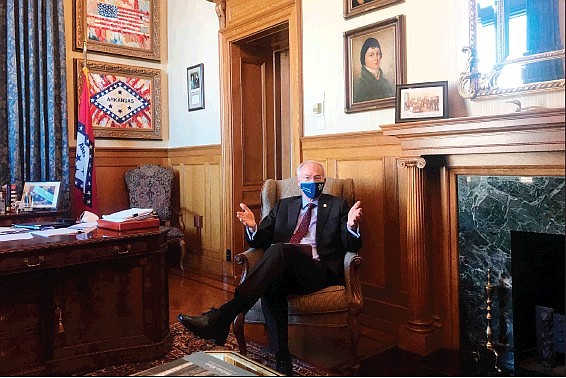This story is a part of The Article, your guide to Arkansas news and culture, presented by the Democrat-Gazette. Sign up for The Article's twice-weekly newsletter here or to see stories that have appeared in past newsletters, go here .
Gov. Asa Hutchinson has laid out the start of a proposal to increase the average teacher salary in Arkansas by $2,000 over the next two years.
Why does Hutchinson want to increase teacher pay?
He said he hopes to begin “narrowing the gap” between the highest and lowest average teacher salaries in the state, a discrepancy of more than $21,000.
The governor said in discussions with superintendents and school leaders that low pay affects the ability to attract teachers, especially to rural or small districts.
What exactly is the governor proposing?
The governor's proposal would create a new funding category, the Teacher Salary Equalization categorical fund, according to an outline of the proposal that Department of Education Secretary Johnny Key distributed to the state Board of Education at a meeting Friday.
The state Department of Education would review salary data each year, and districts and charter schools whose average teacher salary falls below $51,822 would be eligible for money from the Teacher Salary Equalization fund.
Where would the money for the pay increases come from?
The proposal would pull $15 million from an enhanced salary fund pitched by the state House and Senate Education committees. That fund was meant to help school districts cover the cost of raising minimum teacher pay from $31,800 to $36,000 a year by 2023, as required by Act 170 of 2019.
An additional $10 million would be pulled from a general education funding increase the committees recommended.
In their biennial review of educational funding adequacy, the education committees last year recommended a $99.7 million increase in overall public school funding in fiscal 2022 and another increase of $86.9 million in fiscal 2023.
What do legislators have to say so far?
Senate Education Committee Chairwoman Missy Irvin, R-Mountain View, said large discrepancies in teacher pay among school districts cripple many smaller and rural districts, and that she agrees with the governor's goal.
House Education Committee Chairman Bruce Cozart, R-Hot Springs, and Sen. Jane English, R-North Little Rock, the previous Senate Education Committee chairwoman, said they wanted to see more details about where the funding would come from.
“I don't want to steal money from something we already set up,” Cozart said.
House Minority Leader Tippi McCullough, D-Little Rock, said she would be hard-pressed to vote against any raise for teachers.
Get full details on the proposal here, from Capitol reporters Rachel Herzog and Michael Wickline.
